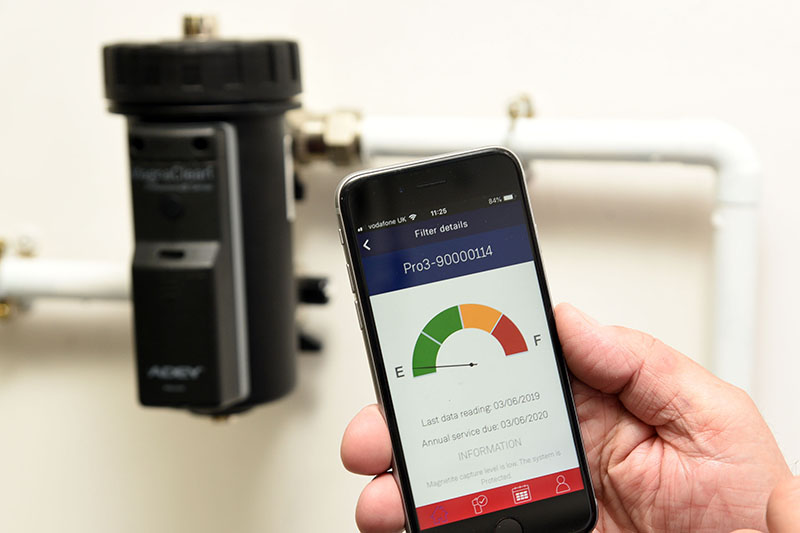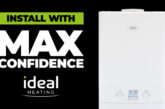
Tom Hood, UK Sales Director at ADEY, looks at the benefit of recommending the latest smart filters to save time and spot issues before they arise.
It may sound a little bit like the plot of the film Minority Report, only here tackling boiler breakdowns rather than future crimes, but ongoing heating system remote monitoring opens the door to preventing boiler problems before they happen. For heating installers the benefits go further too, helping boost revenue streams, provide increased peace of mind for customers and providing the opportunity to deliver a proactive service.
Most installers will understand what sludge is and how it forms from corrosion inside of radiators, pipes, and soldered joints. As well as performance, sludge build-up can also affect a system’s energy efficiency as the system struggles to transfer heat, radiators and pipes are blocked, and the flow of water is restricted. Meaning the bill payer ends up with higher energy bills than they would have if the heating system’s water was cleaner.
However, being able to offer remote monitoring of the filter takes this to the next level in terms of time saving and real-time information. It gives installers an informed view of heating system health without needing to enter the property, so a problem can be fixed before it causes a system breakdown, or at the very least means installers can arrive prepared ahead of a call out.
It also opens the opportunity to create a new revenue stream and increase customer loyalty too. Monitoring the presence and build-up of sludge in the system using smart filter technology installers can offer a remote monitoring service to customers, which gives system visibility without the need to arrange a property visit first, speeding up the process and ensuring prevention of issues before they become that well-known inconvenient breakdown problem. It also goes a long way to reinforce client relationships with year-round heating system surveillance, that adds real value to them.
Promoting preventative maintenance and remote monitoring offers tangible business benefits for installers willing to take up the opportunity. It allows installers to keep a close eye on the level of sludge in the heating system before they step foot in the property. Ultimately, meaning it is possible to fix a problem before it causes an inconvenient and costly boiler breakdown or repair. It helps informed conversations to take place with clients concerning any recommended remedial actions. And it’s a great way to grow business because the ongoing remote monitoring service can become a chargeable extra to clients, creating additional year-round income.
Getting started
Remote monitoring starts with a simple smart filter installation. Quick to install and easy to use, ADEY’s MagnaClean Professional3 Sense filter monitors the build-up of sludge in a heating system so installers can act before the system breaks down. Once connected to the ADEY ProClub app – something that is done at the same time as registering the warranty – the Professional3 Sense is then fitted to the heating system just like any other MagnaClean filter.
What this does is enable remote monitoring of sludge levels so installers can make informed preventative maintenance decisions about whether a potential issue needs attending to or nothing needs doing until the time of the next service.
Additional revenue
Remote monitoring opens the door to new, ongoing revenue streams for installers. By charging a small monthly or annual fee to remotely monitor a heating system at the time of filter installation, it can result in added and welcome profits to complement more traditional income generation.
To make offering this type of service simple, installers can use TradeHelp’s ‘Service Plan’ tool – available through ADEY’s ProClub membership – to sign-up customers to monthly service plans, access complete terms and conditions, and manage the end-to-end process of providing and administering payments on just one interface without the need to draw up separate Ts and Cs or deal with different software. This reduces the administration that comes with selling a service while building a loyal and trusted relationship with customers.
Long-term advantages
There are many ways installers can talk to their customers about the long-term advantages remote monitoring of their heating system can offer. When installing a new boiler, the dangers of system sludge and poor water quality can be highlighted, and remote monitoring could be an excellent way to protect what is an expensive household investment.
Likewise, when undertaking boiler services, benefits such as year-round system protection against breakdowns between services, as well as the ability to spread the cost of a monitoring plan, can be promoted appropriately.
Even distress visits when unexpected breakdowns have occurred can be an ideal opportunity to discuss the idea and cost of ongoing remote monitoring to help reduce the risk of future inconvenient system failures.













